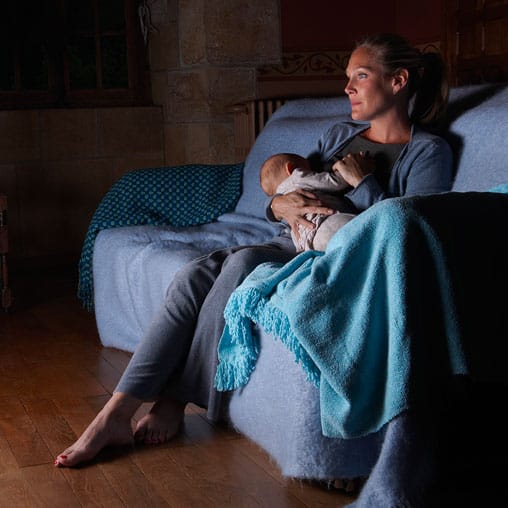
Baby Basics
Are you and your baby seeing more moonlight than you should these days? Join us as pediatricians Dr. Den Trumbull and Dr. Michelle Cretella give parents some sound advice for settling down little ones at bedtime. Dr. Trumbull and Dr. Cretella, both parents themselves, also share what they've learned about meeting the nutritional needs of a baby.
Show Notes
About the Guest
-
Are you and your baby seeing more moonlight than you should these days? Join us as pediatricians Dr. Den Trumbull and Dr. Michelle Cretella give parents some sound advice for settling down little ones at bedtime. Dr. Trumbull and Dr. Cretella, both parents themselves, also share what they've learned about meeting the nutritional needs of a baby.
-

Den Trumbull
Den Trumbull is board certified in pediatrics and former president of the American College of Pediatricians. Dr. Trumbull was born and raised in Panama City, Florida. He received his Bachelor of Science degree in Chemistry at the University of Florida and then attended the University of Miami School of Medicine for his medical degree. After serving in the U. S. Air Force as a pediatrician for four years, Dr. Trumbull joined Drs. Glover and Morrison in private practice in Montgomery, AL in...more
Michelle Cretella
Dr. Michelle A. Cretella, MD, FCP is the President of the American College of Pediatricians. She is a board certified general pediatrician with a special interest in adolescent mental and sexual health. She graduated from the University of Connecticut School of Medicine in 1994; completed her internship and residency in general Pediatrics with honors at Connecticut Children's Medical Center in 1997, and completed a College Health Fellowship at the University of Virginia Health Center in 199...more
Dr. Den Trumbull and Dr. Michelle Cretella give parents some sound advice for settling down little ones at bedtime.
Bob: Dr. Michelle Cretella is a pediatrician. She’s also a mom. When her baby was born, after a while, it seemed like the baby ought to be sleeping through the night. Michelle and her husband decided, “We’re going to let the baby cry.”
Michelle: I told my husband—I said: “You’re going to need ear plugs. We just have to bite the bullet and let him cry through the night. I know that he’s eating well during the day, and I know he is not sick. So, we won’t fear that he’s in pain. At six months, they have a good set of lungs—they can cry for 45 minutes.”
Bob: This is FamilyLife Today for Wednesday, October 7th. Our host is the President of FamilyLife®, Dennis Rainey, and I’m Bob Lepine. We all want our babies to be happy and healthy; right? And if they are crying in the middle of the night, they are obviously not happy. So, should we just let them cry? We’ll talk about that and a lot more today. Stay tuned.
1:00
And welcome to FamilyLife Today. Thanks for joining us. I guess I just have one word to define what we’re going to talk about today—that’s amoxicillin. That’s my word for the day. [Laughter]
Dennis: Amoxicillin?
Bob: Amoxicillin. You remember that; don’t you?—the pink bubblegum medicine?
Michelle: Yes, the pink bubblegum—the pink stuff / the pink stuff.
Dennis: Actually, what I was thinking about, in light of today’s—“Where were you two, 25 years ago, when we could have really used you?” We have a couple of pediatricians with us on the broadcast today—Dr. Michelle Cretella and Dr. Den Trumbull—welcome to the broadcast.
Den: Thank you so much.
Michelle: Thank you so much.
Den: Glad to be here.
Michelle: Yes.
Dennis: Glad you guys are here. Dr. Cretella is married to her husband Mark and, along with their four children, live in Rhode Island. She is the President of the American College of Pediatricians. She’s practiced as a general pediatrician for the past 15 years.
2:00
Dr. Trumbull is married to his wife Nancy, who is listening out in the outer area of the studio here—glad to have her. They have five children. They live in Montgomery, Alabama. He is a board certified pediatrician as I mentioned before.
Actually, together, you two have formed the American College of Pediatricians, along with a few other pediatricians.
Den: Along with a few others.
Michelle: Yes.
Dennis: Yes, along with a few others—and give leadership to that. Explain to our listeners what the American College of Pediatricians is all about.
Den: The American College of Pediatricians is a national professional organization of pediatricians and healthcare providers dedicated to children formed in 2002 by doctors who were concerned that the policies made by the American Academy of Pediatrics were more driven by social consensus polling—and not upon time-honored science— that’s centered around a few hot-button issues.
3:00
One was parenting—authoritative parenting. They were moving more in the direction of permissive parenting. A second one was respect for life from conception—sanctity of life. A third was more of a difficult situation to truly define. That is the adoption of children by same-sex couples based upon what they stated was the fact that children fared as well in heterosexual families as they do in homosexual families. Upon looking at the research, we’ve taken different views than they.
Over the years, we’ve flourished. We have members in about 47 states now. Our goal/ our motto is: “Best for children.” We want to promote what is best for children and not cower away from—just what is best for adults because that seems to be the mainstay of their bent—their bent is more along the lines of adults / ours is more along the lines of children.
4:00
Dennis: Both of you are seeing families come into your offices every day. What are you seeing as you notice families bringing children to receive healthcare?
Bob: Ear infections—right?—number one. [Laughter] Is amoxicillin the number-one most prescribed drug by a pediatrician?
Michelle: Absolutely!
Dennis: Is it really?
Bob: Oh, it’d have to be!
Michelle: It’s the—kids love it.
Bob: We should have bought stock in that when our kids were growing up. [Laughter]
Dennis: And the reason I don’t know much about it—we didn’t have that many ear infections.
Bob: Is that—for young kids, is that the number-one thing?
Michelle: Ear infections, sinus, laryngitis—yes, those still—but I’ve got to tell you—behavior issues are growing.
One of my favorite little sayings to parents is: “Discipline begins at the breast.” Breast feeding, of course, is huge—we do agree with AAP on that particular issue—breast feeding is wonderful for bonding—mother and infant bonding, adequate nutrition / the best nutrition—
5:00
—but also, because you get protection / immune protection from the mother’s antibodies are transferred in the breast milk.
Bob: But explain what you mean when you say, “Discipline begins at the breast.” Yes. What does that mean?
Michelle: Initially, the mothers are encouraged to feed on demand with the babies; but eventually, as they get—oh, let’s say between three to six months—now, you really want to start sleep training. I think Dr. Trumbull—he is a big fan of training infants as I am, young, because they often can just feed for comfort. We want to train them—discipline isn’t about punishment in as much as it is training our children / leading them to do what is best.
Bob: Okay, Dr. Trumbull, we’ve jumped right into the controversy here—I mean, right at the beginning, because demand-feeding versus schedule-feeding is an area that can divide a roomful of new mothers quicker than almost anything else.
6:00
Michelle: Right. Yes.
Den: Demand feeding is a very normal physiologic process, early on. The question is: “At which point do you move toward a more scheduled routine for the child?” For me, I found four to six months is a very reasonable time to begin to help the child have a more scheduled lifestyle—both for the benefit of the mother / the exhausted mother, who might be demand feeding—and also because the child is physiologically able to do that. Actually, I view sleep training as early as four months as the first opportunity to lead your child rather than follow your child.
Michelle: Absolutely.
Den: One of the points we’ve made at the American College of Pediatricians is—we want to encourage parents to lead their children, not follow their children. What is popular today is: “Well, my child wants to do this. I think I should just follow him.” In a subtle way, I’ve found that that begins early on.
7:00
As your child submits to your leadership in the area of sleep and feeding—provided you’ve been given good, physiological, high-quality information, which we’re doing with our patients—then, that begins the leadership and the teaching of submission that follows thereafter in the area of discipline as a toddler and a school-ager.
Dennis: So, you are going right to the issue of parents being in authority and children needing to obey their parents. And there would be those listening to our broadcast, right now—as Bob was intimating just a few minutes—who go: “Now, wait a second! A four-month-old / a six-month-old—they are going to push back?” Now, I have an opinion about this, not from the standpoint of being the pediatrician, but being the daddy. [Laughter]
Bob: Here’s what the parent—you know, here is what a parent will say: “A six-month-old is going to cry if they are hungry. If they are hungry, you should feed them. This idea that you should starve your child for your schedule—
8:00
—“that just seems cruel to the baby.” You’ve heard those arguments before; right?
Den: Sure.
Michelle: Yes.
Den: How important is sleep in the life of an infant, a toddler, a school-ager, and hey—a teenager?
Michelle: And a parent? How important is it—
Bob: I was waiting for it to come around to the parent.
Den: There you go.
Michelle: And the parent.
Den: Thank you. Thank you, Michelle.
Michelle: Yes.
Den: Extremely important. So, it’s a matter of educating and knowing what a child at six months of age is capable of doing. They are capable of going longer than two to three hours without feeding. But if allowed to, chaos can set in. Order is a good thing; but you need to know what type of order to follow / how to accomplish that. That’s where your pediatrician can give you good quality advice.
Bob: Michelle, you’re a mommy.
Michelle: Yes. That’s right. I am. I am a mother of four, and I breastfed all my babies for a good couple of years. Seventy percent of three-month-old infants are able to go five hours without feeding at night.
9:00
Seventy percent—I mean, there are still thirty percent who won’t be right there.
Bob: Right.
Michelle: The key is to know this. I encourage my families: “When your child is three months old, go ahead, put them down when they seem tired—put them down in their crib. Let them put themselves to sleep. At three months, they may cry for 20 minutes—that’s the average—the typical. They will learn to put themselves to sleep. This is a great gift you are giving them—letting them put themselves back to sleep.”
I say to try this for five nights in a row. If by five nights that child is still—at three months old—kicking, screaming, not falling asleep, I will have the family wait: “Okay, let’s wait until four months,”—because, at four months, we can introduce solid foods. They may be able to go longer.
10:00
Bob: So, if at 20 minutes the child is still crying—not going to sleep—
Michelle: And they’re only a three-month-old.
Bob: —do you go get them back up at 20 minutes?
Michelle: I usually do. Would you agree, Den, generally speaking?
Den: I have a system that I put together through the years so I would say, in general, yes. But when the fourth month rolls around, then, I’m face-to-face with a parent. I tell them—I say this every time, “You do not have to do what I’m about to recommend to you because this is a style.” We are not saying—Michelle and I are not saying this is the only way to do it. Your pediatrician may have a different opinion, and that’s okay. But I tell them: “But if you do what I’m about to show you, your baby will sleep through the night 98 percent of the time. So, it’s doable.”
What it amounts to is patterning the day by the nap start times instead of by the feedings—and feeding only when the baby wakes, wakes, wakes, wakes through the day. So, you go from patterning the day by the feeding frequency to patterning the day by the nap start times.
11:00
I’ve found success, but there are other ways to do this.
Bob: And you talk about this as a discipline issue. Really, this is a foundational part of parenting—
Michelle: Right.
Bob: —is how we’re going to handle discipline with our children. And again, parents are divided on this. I know, Dr. Trumbull, this is something that you’ve spent a lot of time looking at—this issue of how parents engage in discipline with their children, not just as babies, but when they are two, and three, and four, and five. How do you coach parents in this area, as a pediatrician?
Den: Parents—if they are not equipped with the confidence to lead their child, they’ll invariably follow their child. Guess what? That’s popular today. So, they’ll get encouragement from the media, from friends, from those even without children: “You need to indulge your child,”—because, after all, he comes back to—it goes back to the goal of parenting.
12:00
Is the goal to entertain and have a happy a baby all the time?—and what I call: “Dodge disappointment”?
Michelle: Right.
Den: Just think about that—dodging disappointment. He’s crying: “I’ve got to give him what he needs.” Or is our goal equipping/teaching self-control, and ultimately, teaching character—character qualities—which we know will go a long way in that child’s experience in school, in lower school, upper school, and as an employee—and even an employer later on. So, I think it has a lot to do with a parent understanding what the goal of parenting is.
Michelle: The other thing, Den, too, you mentioned the word, “needs.” I think parents—as parents, we need to learn the difference between fulfilling our child’s needs versus wants.
Den: Yes. That’s a very good point.
Michelle: That’s really critical. I know in both, as a mother and a pediatrician, I really made an effort to get my kids sleeping through the night between that three- and six-month mark—
13:00
—primarily, for my own sanity—
Bob: Right. Sure.
Dennis: Sure.
Michelle: —but also, because I knew it was going to be good for them. I knew that they need a regular routine. Now, not all of them were sleeping through the night by three-/four- but, definitely, by the sixth-month mark—I knew I was giving them healthy foods.
John, who is now 14—when he was six months old, we have pictures of him—and I lovingly refer to him as my little sumo wrestler baby. He still wanted to nurse three times in the middle of the night. I said: “Oh my gosh, you are a sumo baby. You definitely have enough nutrition here. You don’t…” I told my husband—I said: “You’re going to need earplugs. We just have to bite the bullet and let him cry. I know that he is eating well during the day, and I know he is not sick.”
Over that next five-night period—
14:00
—the first night, he cried nonstop for 45 minutes. My husband threatened to divorce me, but I gave him good earplugs. The next night, it was only 40 minutes. Then, the next night, 30—then, 20—I mean, by the fifth night, he did not wake up. To this day, age 14, an A-bomb could go off outside John’s window, and he will not wake up. [Laughter]
Dennis: Yes.
Michelle: But the bottom line is—together with—parents, together with their pediatrician, assess the true needs of your child; and then, guide them into what’s best for them.
I had another couple with their first baby at three months. They said, “Dr. Cretella, we tried for three nights, and he just seems ravenous.” “That’s fine. That’s good for you. You’re in tune with your baby. You are your baby’s expert.” But you know what?
15:00
By month five, he was sleeping through the night. We introduced foods at four months.
And as Dr. Trumbull was saying, “If you can base it according to naptimes”—and as parents, do not allow the baby to fall asleep on the breast / do not allow the baby to fall asleep on the bottle; but allow them to be content enough that they will just kind of hunker down and settle themselves.
Den: Your point is an important one, and that is—children don’t always want what they need.
Michelle: Right.
Den: And they don’t always need what they want. So, it’s that discernment that is tough in parenting that can cause you to be a little bit softer and a little more non-specific in your leadership. You can end up, before you know it, following your child.
Dennis: I like what you guys are saying because you are not dogmatic in terms of building a box and trying to put a child in a box—
Michelle: That’s right.
Dennis: —because they are individuals and you’re giving room for the individuality of a child.
Michelle: Absolutely.
Dennis: But if Barbara was here, she would be saying, “Amen,” to what you are talking about.
16:00
I think what we are all discussing here is, really, looking at the Bible and getting an accurate view of your child, biblically. They are sweet / they are cute, but—
Bob: But we know what’s going on in the heart; don’t we?
Michelle: That’s right.
Dennis: The Bible is clear. I said, “I believe”—
Michelle: Our nature is fallen.
Dennis: —“God gave Barbara and me six children to solidify our doctrine of depravity—
Bob: Right. [Laughter]
Dennis: —“both the depravity of our children and of the parents who were raising them”; okay? We are selfish!
Den: Yes.
Michelle: Yes.
Dennis: And you see it in your children in the early months of life—how they can be selfish. And what you are really challenging parents to think about—is you’re challenging them to, early on, begin to think of themselves: “You are the parent /—
Michelle: Yes.
Dennis: —“you are in authority. You are called to compassionately care for the child.” We’re not talking about something that’s unhealthy here, but we are talking about teaching the child to begin to curb his appetites—
17:00
Bob: Yes.
Dennis: —for self-indulgence in a culture that is going to feed him that line for the rest of his life / or her life.
Bob: Well, and I think—
Michelle: Right.
Bob: —and I think—and Dr. Trumbull, I’d love for you to comment on this—but I think we’ve all seen those examples of parents who aren’t giving the kind of loving, nurturing, caring discipline to a child. They are either being harsh—
Michelle: Right.
Bob: —or abusive in some way, or they are allowing babies to cry and not caring what’s going on. We get that picture in our mind, and nobody wants to be that parent. There are parents who aren’t disciplining their kids—they are neglecting their kids.
Michelle: That’s right.
Bob: That’s not at all what you are talking about.
Den: No, it’s not. And scientifically—and we’re going to speak for the science—children, early on, are egocentric and selfish.
Michelle: Yes.
Den: So, in that egocentric view of the world, they are self-centered and selfish. We, as parents, are teaching them to be more socialized and more self-controlled—
18:00
—how to get along with others. We’re also teaching them what they want may not be what they need—we are guiding them along a healthier path.
There is no question—there are parenting styles that have been scientifically looked at. One parenting style that is permissive—where parents give in. Another parenting style is where they’re authoritarian—where they are harsh and un-warm and very cold. Then, there is a third one where they give up—they just neglect. Then, there is the authoritative—where there is a balance.
So, really, Bob, what we’re talking about is a balance here between encouragement and correction.
Michelle: Yes.
Bob: Yes, as we’ve talked about that, here on FamilyLife Today, we’ve said: “Kids are asking two questions: Do you love me?—
Michelle: That’s right.
Bob: —and “Can I do whatever I want?”
Michelle: That’s right!
Bob: And a mom and dad need to say, “I love you, desperately”; and “No, you can’t do whatever you want.” And the child needs to understand.
Michelle: Yes.
Dennis: And for the rest of your life, you’re going to learn—
Bob: That’s right.
Dennis: —you’re going to learn—
19:00
Bob: —that you can’t do whatever you want.
Dennis: —that life has boundaries.
Bob: Right.
Michelle: It does. That’s exactly right. We’re talking about warmth and setting boundaries. That’s the key.
Dennis: And as you were talking, I was thinking about how the Apostle Paul, who had been discipling some followers of Christ at Thessalonica—how he compared himself to both a mother and a father. And it’s interesting how he describes this in Chapter 2 of
1 Thessalonians—he said, “But we proved to be gentle among you, like a nursing mother taking care of her own children.” So, we really are to have the compassionate caring—looking out for what’s best—and that does mean, not necessarily giving your child everything he or she wants.
A little bit later on in the chapter, Paul said—he said, “For you know, like a father with his children, we exhorted each one of you and encouraged you and charged you to walk in a manner worthy of God who calls you into His own kingdom and glory.”
20:00
Now, these passages are not directed to parents, but Paul is tapping into something that’s very deep—a deep river of how a mother tenderly cares and how a father needs to provide direction, encouragement, exhortation—so do moms, by the way—but as parents, we need to be an authority / we need to be in charge. We need to be compassionate, caring, loving. We need to be, as a couple, in tandem—
Bob: Yes.
Michelle: Yes.
Dennis: —a couple who are together—
Michelle: Absolutely.
Dennis: —like a bicycle built for two headed in the same direction, agreeing on how we’re approaching our children. You can’t have a divided house on these issues.
Bob: Yes, you’ve got to know where the fences are, and you’ve got to be in agreement about where those fences are. That’s why I think it’s good for parents to talk about:
21:00
“How are we going to handle these things?” I’d encourage them to go to your website because I think you guys, at the American College of Pediatricians, have come up with good resources / good, sound advice. Maybe, parents aren’t going to agree with everything you are saying; and we get that.
Michelle: Right.
Bob: But it would be good for you, as husband and wife, to talk about this and say, “What do we think is the right thing to do?” We’ve got a link on our website at FamilyLifeToday.com to the American College of Pediatricians website.
You’ll also find a link that has information about a video series. We got some listeners together in a studio and some cameras and just had a conversation. Dennis, you and Barbara and I talked about how you, as parents, handled some of these early childhood issues with your kids. Find out more about the Right from the Start video series when you go to FamilyLifeToday.com and click the link that says, “GO DEEPER.” Or you can call us if you have questions about the series at 1-800-FL-TODAY—
22:00
—1-800-“F” as in family, “L” as in life, and then, the word, “TODAY.”
You know, these issues that we’re talking about today—these are some of the very real issues that moms and dads face and have faced for centuries. I mean, we’re not talking about anything that hasn’t been talked about before by parents in previous generations. Our goal, here, is to provide you with practical help; but we also want that help to be anchored and rooted in our understanding of what the Scriptures teach about our responsibility as parents and raising up the next generation, understanding that children are a blessing from the Lord.
Our goal, here at FamilyLife, is to provide you with practical biblical help and hope for your marriage and your family. We appreciate those of you who join with us in this endeavor as financial supporters of this ministry.
23:00
In a very real sense, if it weren’t for you, we wouldn’t be here because more than 65 percent of the funds we need to operate this ministry come from folks, like you, who either will give a monthly donation as a Legacy Partner or will, from time to time, make a donation in support of this ministry.
And if you can help with a donation today, we have a gift we’d like to send you as a way of saying, “Thank you.” It’s designed to get better conversations happening around the dinner table. It’s a resource from Barbara Rainey called “Untie Your Story.” It’s a spool of napkin ties, and each one has a different conversation starter—a question that you can answer that will get some good conversation going around mealtime.
It’s our thank-you gift when you go to FamilyLifeToday.com and click the link in the upper right-hand corner of the screen that says, “I Care,”—make an online donation. Or when you call 1-800-FL-TODAY, make your donation over the phone. Or you can mail your donation to us at FamilyLife Today at PO Box 7111, Little Rock, AR.
24:00
Our zip code is 72223.
Now, tomorrow, we want to talk about, among other things, screen time. Is it okay for the three-year-old or the four-year-old to have the iPad in the car seat on the way to school, on the way home from school, when you are running around town, if you’re on vacation—hours at a time? We’ll talk more about that tomorrow. Hope you can be with us for that.
I want to thank our engineer today, Keith Lynch, along with our entire broadcast production team. On behalf of our host, Dennis Rainey, I’m Bob Lepine. We will see you back next time for another edition of FamilyLife Today.
FamilyLife Today is a production of FamilyLife of Little Rock, Arkansas.
Help for today. Hope for tomorrow.
We are so happy to provide these transcripts to you. However, there is a cost to produce them for our website. If you’ve benefited from the broadcast transcripts, would you consider donating today to help defray the costs?
Copyright © 2015 FamilyLife. All rights reserved.
1
Episodes in this Series

Raising Teenagers


